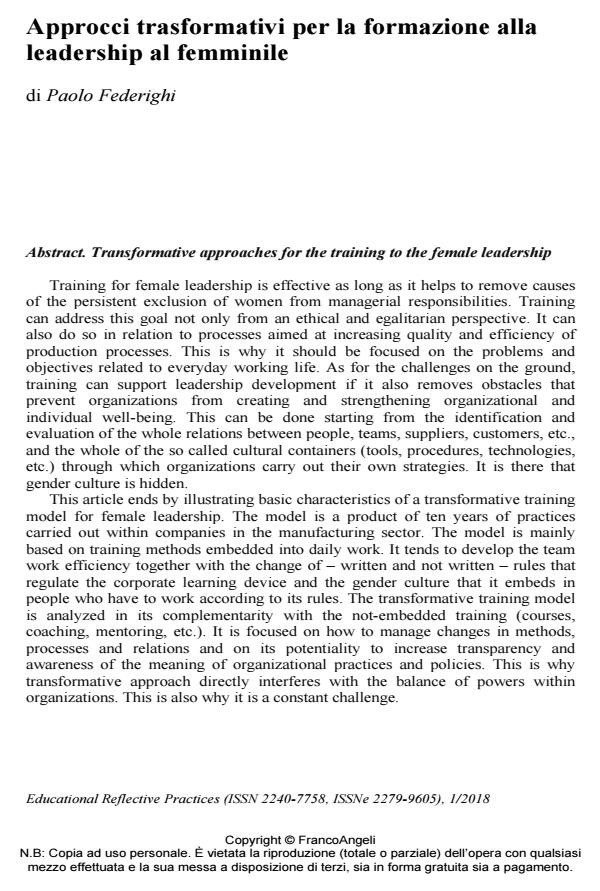Approcci trasformativi per la formazione alla leadership al femminile
Titolo Rivista EDUCATIONAL REFLECTIVE PRACTICES
Autori/Curatori Paolo Federighi
Anno di pubblicazione 2018 Fascicolo 2018/1
Lingua Italiano Numero pagine 18 P. 52-69 Dimensione file 212 KB
DOI 10.3280/ERP2018-001004
Il DOI è il codice a barre della proprietà intellettuale: per saperne di più
clicca qui
Qui sotto puoi vedere in anteprima la prima pagina di questo articolo.
Se questo articolo ti interessa, lo puoi acquistare (e scaricare in formato pdf) seguendo le facili indicazioni per acquistare il download credit. Acquista Download Credits per scaricare questo Articolo in formato PDF

FrancoAngeli è membro della Publishers International Linking Association, Inc (PILA)associazione indipendente e non profit per facilitare (attraverso i servizi tecnologici implementati da CrossRef.org) l’accesso degli studiosi ai contenuti digitali nelle pubblicazioni professionali e scientifiche
Training for female leadership is effective as long as it helps to remove causes of the persistent exclusion of women from managerial responsibilities. Training can address this goal not only from an ethical and egalitarian perspective. It can also do so in relation to processes aimed at increasing quality and efficiency of production processes. This is why it should be focused on the problems and objectives related to everyday working life. As for the challenges on the ground, training can support leadership development if it also removes obstacles that prevent organizations from creating and strengthening organizational and individual well-being. This can be done starting from the identification and evaluation of the whole relations between people, teams, suppliers, customers, etc., and the whole of the so called cultural containers (tools, procedures, technologies, etc.) through which organizations carry out their own strategies. It is there that gender culture is hidden. This article ends by illustrating basic characteristics of a transformative training model for female leadership. The model is a product of ten years of practices carried out within companies in the manufacturing sector. The model is mainly based on training methods embedded into daily work. It tends to develop the team work efficiency together with the change of - written and not written - rules that regulate the corporate learning device and the gender culture that it embeds in people who have to work according to its rules. The transformative training model is analyzed in its complementarity with the not-embedded training (courses, coaching, mentoring, etc.). It is focused on how to manage changes in methods, processes and relations and on its potentiality to increase transparency and awareness of the meaning of organizational practices and policies. This is why transformative approach directly interferes with the balance of powers within organizations. This is also why it is a constant challenge
- La formazione incorporata nei contesti lavorativi (ISBN:978-88-5518-324-6)
Paolo Federighi, Approcci trasformativi per la formazione alla leadership al femminile in "EDUCATIONAL REFLECTIVE PRACTICES" 1/2018, pp 52-69, DOI: 10.3280/ERP2018-001004